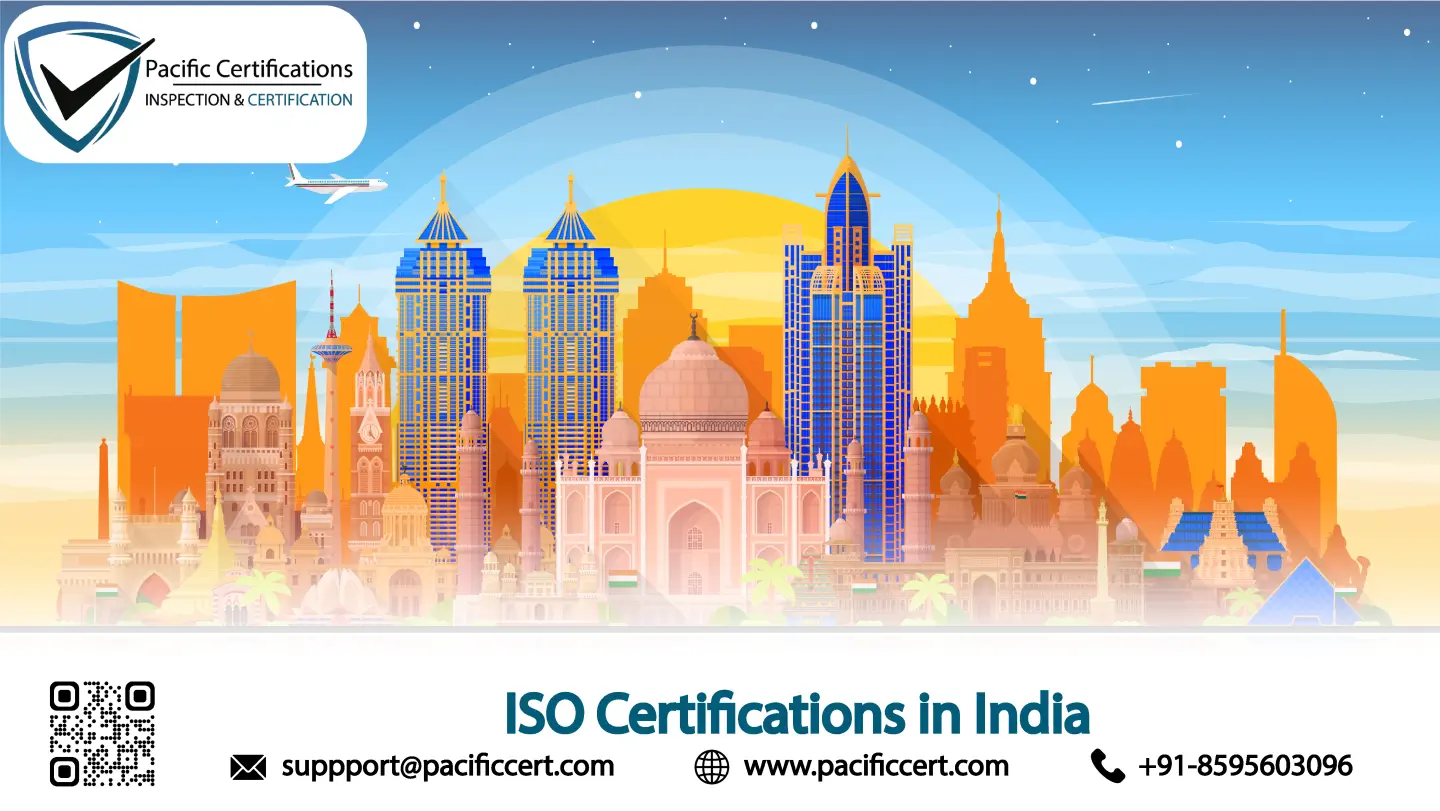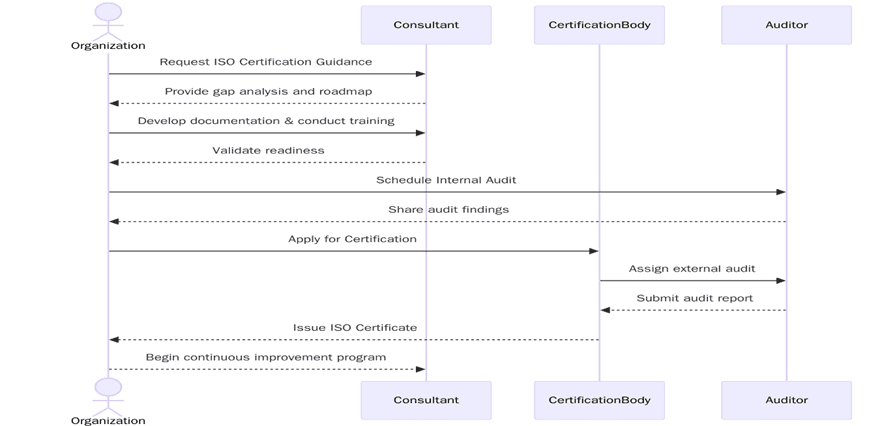ISO Certifications in India, Popular Standards, Requirements and Benefits

Introduction
India’s economy spans precision manufacturing and automotive, pharmaceuticals and med-tech, construction and infrastructure, agri-food and beverages, logistics through major ports and ICDs, healthcare and laboratories and a powerful digital ecosystem across Bengaluru, Hyderabad, Pune, Delhi NCR, Chennai and Mumbai. By adopting standards such as ISO 9001 (Quality Management), ISO 14001 (Environmental Management) and ISO 45001 (Occupational Health & Safety), Indian companies can improve efficiency, reduce waste and earn trust from partners and regulators. For fast-growing areas like ICT, construction and agrifood, ISO certification has become a practical step to attract international clients and compete with confidence. These programs provide auditable proof on quality, safety, environment, information security and continuity that buyers and lenders accept across the EU, US and Asia.
Begin your ISO application in India with Pacific Certifications , get a documented scope and a proposed Stage-1/Stage-2 audit plan under recognized accreditation.
Economic Context & Industry Overview
India is an export-oriented, services-heavy economy that is rapidly scaling advanced manufacturing through PLI programs and logistics reforms. Construction, EPC and public works remain active; food processing and cold chains are expanding; ports, rail corridors and logistics parks are being upgraded and digital platforms keep growing across finance, retail and public services. Buyers, regulators and funders increasingly expect auditable management systems for supplier approval, tender participation and due diligence making ISO a common language across plants, sites and digital operations.
Why ISO certification matter in India?
Tier-one buyers and public bodies ask for evidence-based systems with clear records. ISO shortens vendor approval, stabilizes quality on precision lines, reduces incidents on sites, supports emissions and energy programs and protects data and uptime for banks, telecoms and cloud platforms. For food and beverage, HACCP-based proof is vital for retailer acceptance. Certification also organizes day-to-day evidence, policies, KPIs, competence, risk files and corrective actions, so reviews by customers, regulators and lenders move faster.
Popular ISO Standards in India
Certification Process in India
Preparation starts with an honest view of how work runs today and how evidence is captured. The aim is to make your system auditable without reinventing daily routines. Below are the steps to consider:
List products services sites headcount and high-risk processes for clear scope
Map processes end to end to show handoffs records and responsibilities
Set policy and measurable objectives linked to customer and legal needs
Assemble evidence packs for production maintenance labs IT and logistics
Train process owners keep competence matrices and attendance records current
Calibrate instruments verify methods and file certificates for quick checks
Run internal audits that sample high-risk tasks and supplier interfaces
Hold management review with KPIs audit results complaints legal updates and actions
Schedule Stage 1 for readiness and Stage 2 for implementation verification align multi-site sampling to risk
Blend on-site checks with remote interviews where suitable to reduce travel time
Keep permits licenses and regulatory reports organized for quick verification
What are the requirements of ISO Certifications in India?
Build the system around real work on lines, sites, clinics, warehouses and data rooms and align with Indian/EU buyer expectations so evidence stands up in audits, inspections and portal reviews; below are the key requirements:

Scope that matches products/services, processes and sites (single or multi-site).
A documented system with controlled procedures and records that reflect practice.
Risk assessment with operational controls for real hazards (HACCP, site safety, environmental aspects, privacy/security, energy) and change management.
Competence matrices and training records for process owners and high-risk roles.
Internal audits with reports, nonconformities, root-cause actions and verified closures.
Management review with inputs (KPIs, audits, incidents/complaints, legal updates) and tracked decisions.
Standard-specific artefacts: HACCP & CCP logs (ISO 22000), Statement of Applicability and risk files (ISO/IEC 27001), HIRA & PTW (ISO 45001), aspect-impact registers and objectives (ISO 14001), energy review & EPIs (ISO 50001).
Legal/other requirements register with permits, inspections, calibrations, monitoring data and supplier compliance evidence.
Tip:Map controls to DPDP Act 2023 for personal-data processing, environmental consents under MEFCC/CPCB/SPCBs, Factories Act/Labour Codes for OH&S and FSSAI rules for food chains
What are the benefits of ISO Certifications in India?
Use certification to improve tender win rates, reassure lenders/investors and keep performance steady across shifts and sites; below are the key benefits:

Faster prequalification in buyer portals and public procurement
Fewer incidents, defects and unplanned stoppages on sites and plants
Clear roles and competence development for critical operations and maintenance
Traceable data for warranty, claims, ESG and due diligence
Stronger supplier control through audits, KPIs and corrective actions
Measurable gains in energy use, waste, emissions, uptime and yield
Stronger brand signals across the EU, US and regional markets
Market Trends
The Digital Personal Data Protection Act, 2023 sets a unified baseline for lawful processing, consent, grievance redress and cross-border conditions, raising expectations that banks, fintech, telecom and public platforms will lean on ISO/IEC 27001 (security), ISO 22301 (continuity) and ISO/IEC 20000-1 (service quality) to evidence control and incident readiness as rules mature. (source: MeitY) Energy transition & grid readiness: Government plans target 500 GW of non-fossil capacity by 2030 with annual RE bidding trajectories, pressure that will push utilities and large users to formalize ISO 50001 and pair it with ISO 14001/45001 for audited EHS performance and with ISO 22301 to manage grid events as new capacity, storage and transmission build-outs proceed.
A second policy plank is logistics competitiveness. The National Logistics Policy aligned to PM Gati Shakti aims to cut logistics costs and lift India into the LPI top-25 by 2030, a shift that will nudge port terminals, ICDs and 3PLs toward ISO 9001/14001/45001/28000 to meet chain-security, safety and environmental expectations as throughput grows. (source: Press Information Bureau)
Challenges Faced in India
Operational, regulatory and evidence-readiness issues related to getting certified can cause delays, budget limits and staffing gaps, incomplete or outdated documentation and records, weak internal audits and corrective actions, supplier-control gaps, multi-site sampling and travel logistics, calibration and permit backlogs and data/privacy mapping for ICT; below are the key challenges:
Budgeting for certification time and ongoing system maintenance
Seeing ISO as “compliance” rather than a performance tool in some teams
Shortage of seasoned internal auditors and process owners outside major hubs
Stalling on document control, internal audits and corrective-action discipline
Multi-site and supplier sampling (e.g., farm-to-port or plant-to-DC chains) complicating logistics and evidence quality
What is the cost of certification in India?
Budgets are confirmed after scoping and reflect headcount and risk, the number and spread of sites, your chosen standards (single vs. integrated such as 9001+14001+45001), sector sampling depth (labs/cleanrooms, process plants, cold chains vs. offices) and travel/logistics. Your proposal itemizes Stage 1, Stage 2 and surveillance days, clarifies on-site versus remote activities and highlights any multi-site efficiencies so budgets remain transparent and predictable.
For personalized quote, contact [email protected].
What is the timeline for certification in India?
Timelines depend on document and record readiness, the speed of closing any Stage-1 findings, whether you are single- or multi-site and whether your program is single-standard or integrated. Coordinating audit windows around shutdowns, release cycles, harvests or peak seasons and auditor travel to regional sites, also affects duration. A well-prepared single site can progress from application to decision within one audit cycle; multi-site or integrated programs typically require additional planning and sampling time.
How Pacific Certifications can help?
Pacific Certifications audits and certifies ISO management systems for automotive and machinery, pharmaceuticals and med-tech, construction and materials, agrifood and beverages, logistics and ports, healthcare and labs and ICT/cloud across India. We work under recognized accreditation with transparent pricing and an experienced local team that understands site realities and buyer expectations. Our certificates are accepted by procurement portals and international customers and we are recognized by ABIS.
Request your ISO audit plan and fee estimate. We will help you map Stage 1 and Stage 2 timelines and evidence requirements for your organization. Contact us at [email protected] or visit www.pacificcert.com.
Accredited Training Programs
Pacific Certifications provides accredited training programs in India for ISO 9001, ISO 14001, ISO 45001, ISO 22000/FSSC 22000, ISO/IEC 27001, ISO 22301 and ISO/IEC 20000-1.
Lead Auditor Training: for professionals auditing these systems across Indian industries.
Lead Implementer Training: for personnel establishing or improving systems in plants, sites, cold chains, hospitals, utilities and ICT platforms.
These programs are conducted online or onsite, depending on client needs under ISO/IEC 17024 for personnel certification.
To begin the process or request a quotation, contact us at [email protected] or visit www.pacificcert.com.
Our team will guide you through the audit and certification process and planning stages specific to your operations in India.
Ready to get ISO certified?
Contact Pacific Certifications to begin your certification journey today!
Suggested Certifications –
Read more: Pacific Blogs

